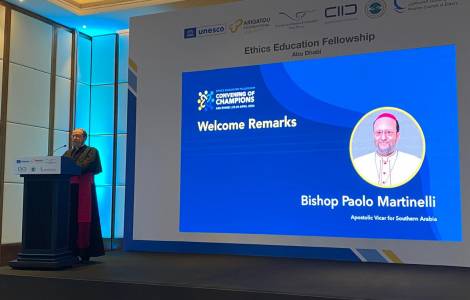Asia/United Arab Emirates – Interfaith Education: Investing in a Hopeful Future
Monday, April 29, 2024

Written by Paolo Martinelli ofmCap*
Here is the full text of Bishop Paolo Martinelli's talk at the conference “Convening Champions: Ethical Education to Contribute to Global Citizenship and Build Inclusive and Peaceful Societies.” The conference was sponsored by UNESCO, the Islamic Council of Elders, the Human Fraternity Committee, and others, and was held in Abu Dhabi from April 23 to 25.
ABU DHABI (Agenzia Fides) – Cardinal Pietro Parolin, Secretary of State for the Holy See, recently said that an act of education is always an act of hope. Investing in the education of a new generation means investing in the future. All parents must not only provide their children with food and a roof over their head, but above all the ethical and spiritual values that guide their children's future and enable them to become true citizens who can face the future with courage. I would like to give you a perspective. Silence. From this perspective, the religious dimension is an absolutely essential part of the educational experience. Indeed, religion permeates the heart of anthropological experience. For religion is concerned with the relationship of each person to God, working together with all people of good will towards a more humane and fraternal society.
The concept of interfaith education introduces a new concept that is growing in the consciousness of people and religions. In this context, it is important to point out the “Document on Human Fraternity” signed here in Abu Dhabi by Pope Francis and His Holiness Dr. Ahmad Al Tayeb, Grand Imam of Al-Azhar. This document undoubtedly represents a new chapter in the history of interfaith relations and is a valuable tool for interfaith education.
With the utmost respect for diversity, religions follow a common path where believers of different faiths learn to know and respect each other and jointly promote ethical and spiritual values for the benefit of humanity. You are being asked to do so.
Interreligious education means, first of all, the recognition that all people are religious beings, created to relate to God and others in pursuit of the common good. Authentic educational experiences must foster religious sentiment, a constitutive reference to a transcendent, omnipotent, benevolent, and creative God who desires that all believers treat one another as brothers and sisters. not. The public schools managed by the Apostolic Vicariate of the United Arab Emirates aim to make a modest contribution to this interreligious education that educates new generations of cooperation and solidarity among all peoples. Religions have a common mission of reminding humanity of the need to take care of the religious and ethical aspects of life. Without God, humans would become inhuman. The Abu Dhabi Document asserts: “The true teachings of religions urge us to be firmly anchored in the values of peace and uphold the values of mutual knowledge, human fraternity and universal coexistence. A firm belief that religion works to restore wisdom, justice, and righteousness. Philanthropy to protect new generations from the domination of materialistic ideas and the dangers of political practices based on greed and indifference to excessive gain. and to reawaken the religious consciousness of young people. All this is based on the law, not on the force of the law.”
If every true educational experience is an act of hope and a path forward, then interfaith education offers even greater hope for all humanity. It is the possibility of creating a more fraternal and humane society, where tolerance, coexistence, solidarity and social friendship reign. A new generation is calling on adults to bear witness that a peaceful world is possible. We renew our resolve to support the hopes of a new generation. May Almighty God bless our efforts to promote interfaith education for a more fraternal world. (Agenzia Fides, April 29, 2024)
* Apostolic Vicar of South Arabia
share:


